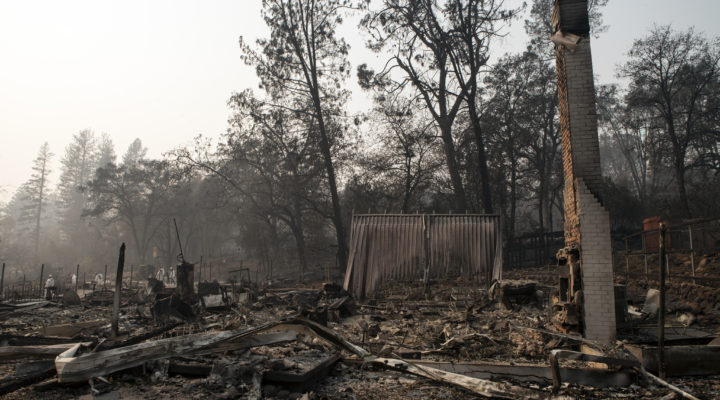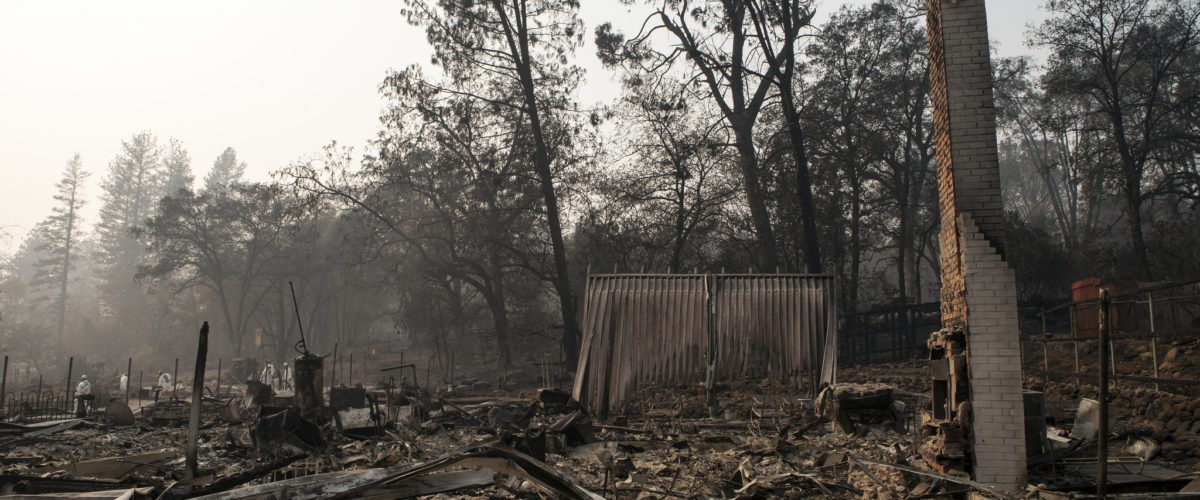The Camp Fire in Northern California killed nearly 90 people and who knows how many animals, charred 153,000 acres and destroyed more than 13,000 structures in early November.
The aftermath – thousands left homeless in an already saturated housing market, and the immeasurable emotional scars from traumatic stress – is stretching area public safety, educational, medical and counseling agencies to the breaking point.
But what looks like insurmountable chaos and suffering to many is viewed as an opportunity to live out a calling for one small-but-feisty Baptist congregation in Butte County, where the fire, one of the worst in state history, occurred.
Chico First Baptist Church has thrown itself headlong into responding to the appalling need generated by the wildfire. Its efforts include working to find housing for displaced families and hosting special needs classes for public schools displaced by the blaze.
The suddenness of the fire, and the rapidity of its destruction, created instantaneous personal and institutional emergencies that wound up on the doorstep of the American Baptist congregation within hours and days of the event, said Pastor Gail Renee Hill.
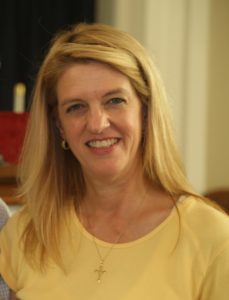
Gail Renee Hill
But they weren’t emergencies for Chico First Baptist, which instead took them in stride, she said.
Hill said she didn’t have to seek formal church approval to help the individuals and agencies that have come looking for it.
“We have the ability to be nimble and just say yes,” she said. “We don’t have go to through a lot of meetings and committees and votes.”
So it was when the local school district came calling, first seeking space in which to train teachers in how to help students re-adjust to the classroom after missing a month due to the fires. Then the district asked if the church could host two special needs classes through the end of the school year in June. The church agreed.
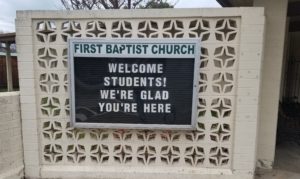
A sign greets students attending public school classes at Chico First Baptist.
Formality was unnecessary because the congregation of mostly seniors – with weekly worship attendance around 40 – has been saying yes to local needs for years, Hill said.
“Seeking justice for all people and using our God-given talents for others, that’s a natural part of this church’s DNA,” she said.
‘Everybody here wants to help’
The Camp Fire made news around the world when it destroyed most of Paradise, a foothills town of about 26,000 located about 14 miles from Chico. Both are located about 90 miles north of Sacramento.
Nora Keeny, her husband Alex and their dog, a boxer-mix named Bruce, were among the thousands who lost residences in the blaze.
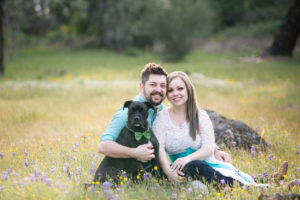
Alex and Nora Keeny, with their dog Bruce.
“We were renting a house in Magalia,” Keeny said about the heavily damaged community located just north of Paradise.
“It was completely leveled.”
For a while they stayed with her mother more than an hour away but have since found temporary residence in an apartment in Chico owned by a relative of Hill’s husband.
It was a connection Keeny made because she works part-time as the administrative assistant at Chico First Baptist.
While Keeny and her husband do not belong to or worship at the church, she’s been embraced and nurtured by the congregation before and since the fire.
“Having the community and the support has been great. Everybody here wants to help,” she said.
Her job there also has placed her on the front lines of the church’s efforts to help those who call for assistance.
And seeing the teachers who came to train at the church work through their own losses as they prepared to teach classes there has been inspiring, Keeny said.
“This church was really wanting to do something and to help the community,” she said. “It’s good for all of us because it gives our church the ability to grow and do more things.”
‘A little creative with our resources’
And it is doing more things, such as seeking partnerships to provide micro-loans or grants to those in need and cooperating with other religious groups to launch support groups for victims of the fire.
Hill adds that the congregation was committed to outreach before November fire. It is involved in interfaith and ecumenical efforts and has a calling to serve the area’s homeless, including by being an overflow facility if the local shelter exceeds capacity.
That culture is what attracted Hill to the church in 2017.
“When I interviewed with this church, I asked is there any person or situation or occurrence that, if they came to us, we would say no,” Hill said. “They couldn’t come up with anything and I knew, OK, that was my church.”
Such outreach is experienced not as making sacrifices, but as a blessing, she added.
“All we had to do was be a little creative with our resources.”
What’s plain now, Hill said, is that the church was being prepared for its role after the Camp Fire.
“You can just see God’s hand upon it.”

